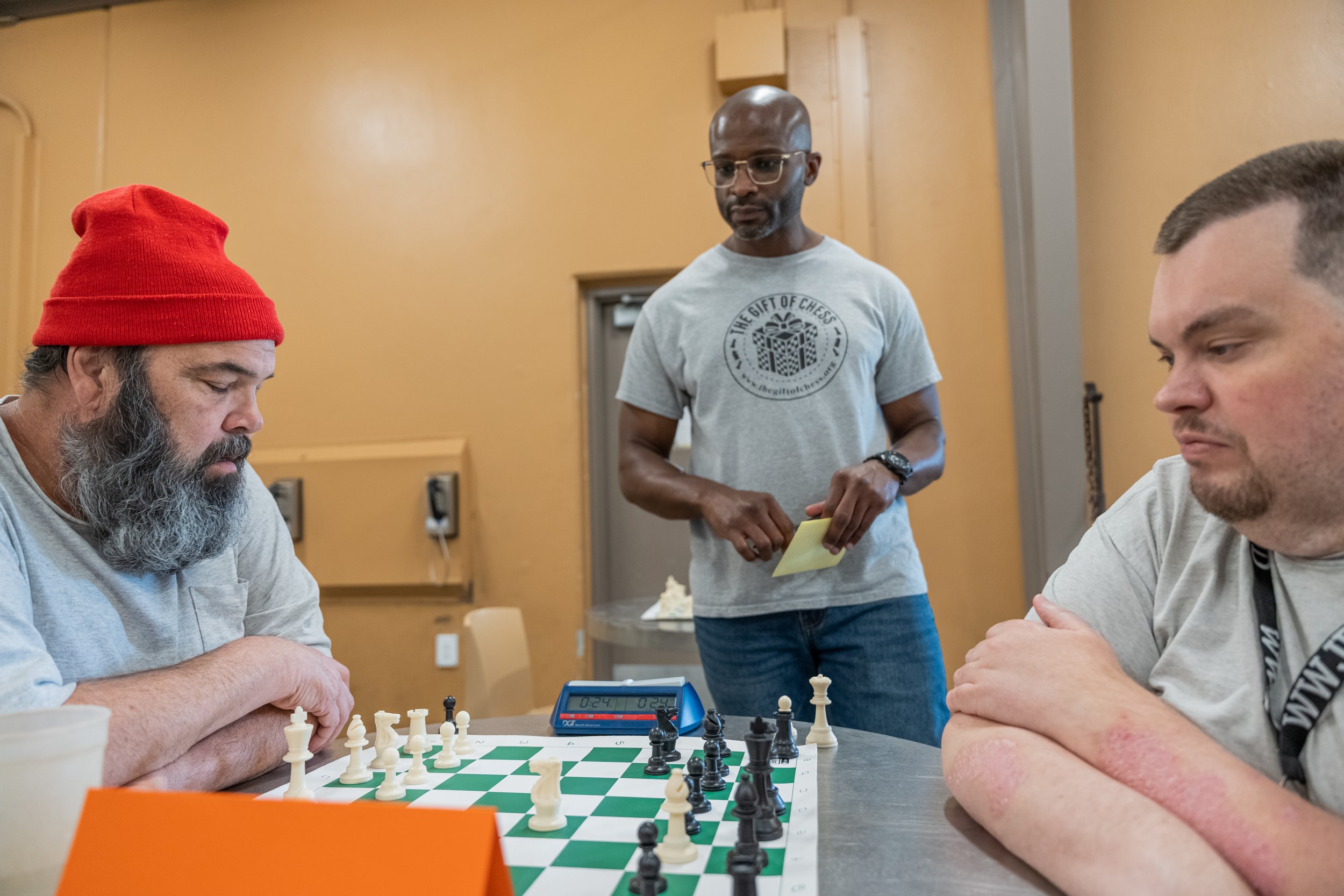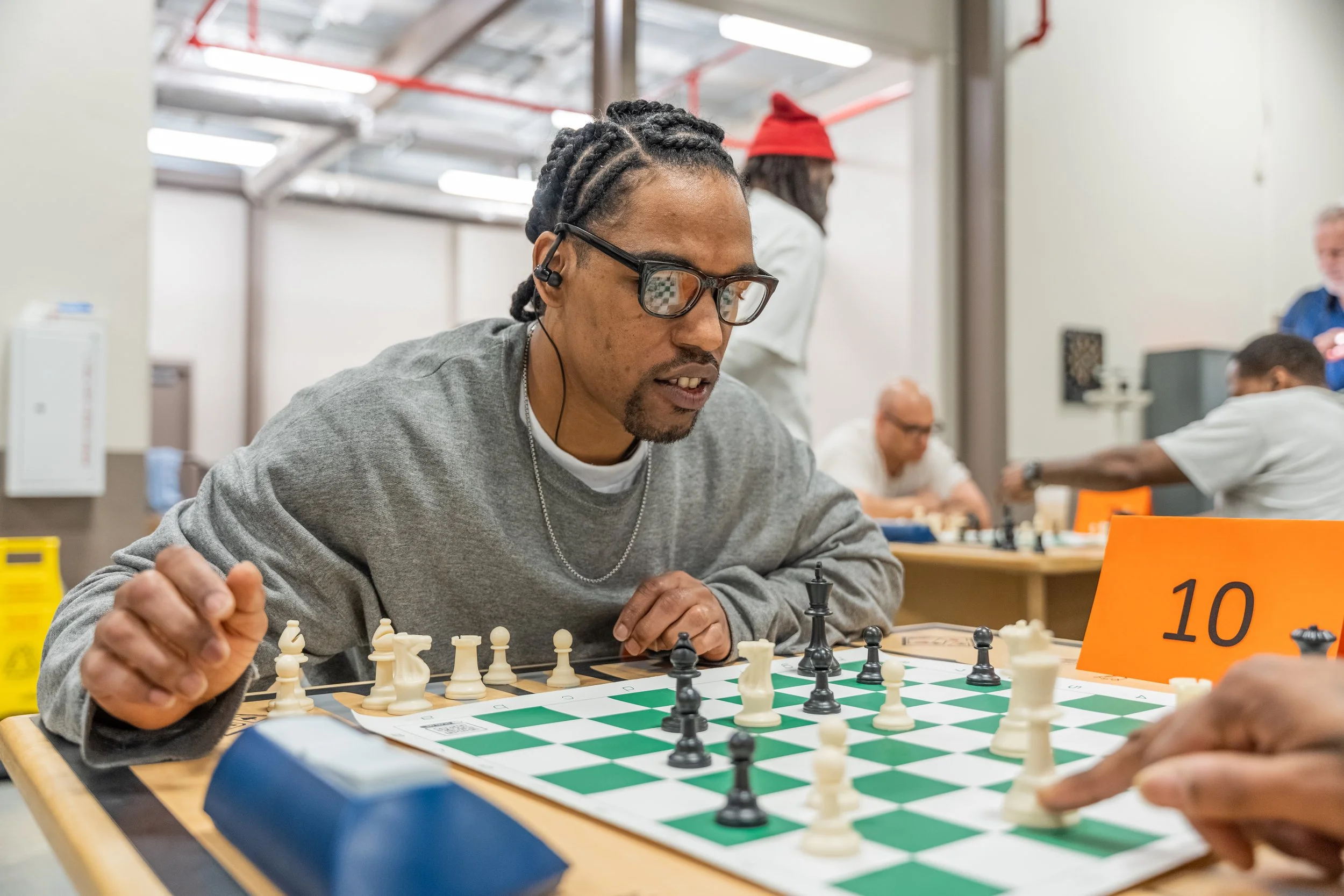The Gift of Chess hosts US Rated Chess Championship at Lansing Correctional Facility.
Traveling to Lansing correctional facility was a journey that I had looked forward to. The closer that I got to the facility I wondered about the type of anxiety I would have once I entered the prison. What I noticed after this visit was why I had immersed myself inside of chess so deeply. It was to escape the harsh realities of prison life. As I entered LCF I felt the tension, pain, and stressors of the environment. The same stressors I had felt during my stay there but overcome through my deep immersion into chess. Chess made my mind go into a different place. I was no longer in prison when I played chess, and the circumstances that went on around me did not matter for those hours, most often several hours, that I was “away” deep inside my thoughts in the world of chess. This was my place of solace. I was able to somewhat “escape”.
As a result, I developed skills that I see now will benefit me for the rest of my life. It is our goal and mission to help others incarcerated nationwide, starting first here in my home state of Kansas, to learn, develop and cultivate their thinking skills and transform themselves into productive members of society, and model inmates. I am offering them not only a tool but a “way out” mentally and physically. They can find solace in the trenches of chess with one another. They can find skills that would rehabilitate their thinking and mental health. Thus, providing away out physically that would increase their chances of never returning.
The pictures that were taken by Pulitzer Prize winner Photojournalist John Moore, and up and coming videographer Jamal Dozier, captured these moments that conveyed the power and importance of chess in prisons. These inmates can learn to respect one another and be patient with each other from playing chess. While there, I noticed the prison dynamics. This is the different rival gangs and groups that are normally antisocial towards one another. Yet, for this moment chess brought them all together with a sense of relief, peace, and camaraderie. All conflicts went out the window during the time that we were there. There were no threats or having to look over their shoulders. They were congratulating one another, high-five-ing and shaking hands.
The Gift of Chess was provided this platform through our partnership with the Kansas Department of Corrections, steered under Secretary of corrections Jeff Zmuda, and organized by Statewide Gift of Chess coordinator, Captain Kevin Oneth. The Departments motto is to Invest in Individuals and provide opportunities to acquire new experiences and skills to support personal and professional advancement and future success. As well as creating environments for change, well-being, and designing systems that encourage positive behaviors, healthy choices, and self-improvement. We were delighted to see the staff genuinely pleased for the residents and the positive vibes that permeated the gym. These men were super respectful of the guest that entered the facility, they were hyper- appreciative of the opportunity, and were thoroughly engaged. This was a win-win for all involved. Our partnership with KDOC is the epitome of the motto “Engage and Strengthen Partnerships and to Expand partnerships with individuals and organizations within our communities to support our mission.”
We would like the nation to know that this is the new most progressive ideal to change life and its harsh realities for prisoners and their staff alike. Many prisons are experiencing staff shortages, what better way than to occupy residents’ minds through providing them chess and engaging their thoughts and influencing their behaviors through this thought-provoking instrument. Keeping residents busy with playing chess and competing in a non-contact sport is necessary and a brilliant idea to curb prison violence, gang activity and drug usage. Creating an atmosphere that fosters intelligence and celebrates good decision making, has the great potential to influence the rest of the population; your strongest leaders in these environments will begin to encourage positive/smart behavior and shunning behaviors that are disruptive and harmful for expansion of other opportunities. This in turn protects the staff who come into these facilities each day to do their job, expecting to return home to their families.
Chess is an activity that demands thinking and causes each environment where it is played to become quiet and academically sound. Thus, the energy level is lowered and the potential for outburst is highly unlikely. As mentioned earlier it is also a non-contact, highly competitive sport. Many a times I have witnessed fights over basketball or any other contact sport in prisons many times.
Damon V. was in and out of segregation and used to play chess by making one out of paper and coloring the strips of paper with a pencil for black chessmen. He used chess to occupy his mind while in “the hole”, a place where many a resident have lost their mind, or literally went insane, some have even committed suicide. He said chess was a way to keep his mind sharp.
D.L. was another guy who taught himself to play chess while serving nearly 11 years in segregation. He used to play his opponents through the ventilation system. By numbering their boards from 1-64 they would always place the white pieces on the low numbers and the black pieces on the high numbers to start the game. He won 2 nd place in the tournament and was a respected opponent. I was able to illustrate the importance of time management with the use of chess clocks.
Something totally new to them. They had never played chess with a clock before. To help them understand how chess clocks while playing help to facilitate effective time management was key. I shared with them the basics of chess to have success through the fast development of pieces and then looking for attacking opportunities. I compared this to the importance of developing their character, talents, and gifts. Then developing a support team of family and friends to help them move forward in life.
Tony Ballard
Director of Prison Outreach
prisonoutreach@thegiftofchess.org





























